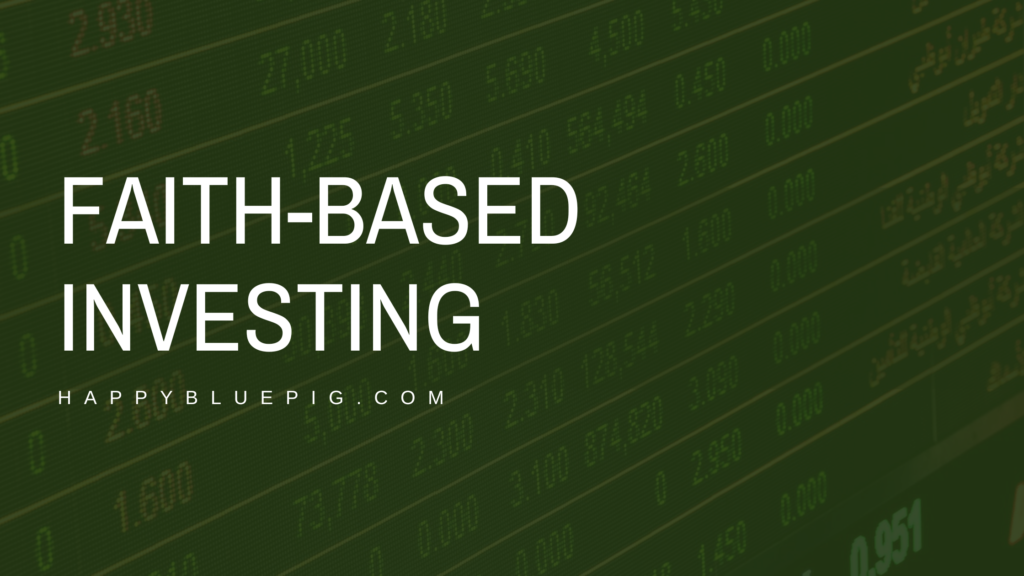I’ve been hearing a lot about faith-based investing lately, and I’m ready to apply those principles to our family’s investments. If you’ve never heard of faith-based investing, don’t worry. This is a relatively new development. Ten years ago, you wouldn’t have been able to easily find these funds or financial advisors who practice faith-based investing. The goal of faith-based investing is to only invest in companies that align with your values. Investing is part ownership. If I’m going to own a piece of a company, then naturally, I want to make sure I’m owning something good! Good return on my investment, yes, but also a company good for society and good to employees. And, of course, the company should demonstrate integrity in business dealings. Let’s take a closer look at how to invest based on your values and the impact that can have!
This post may contain affiliate links, which means I’ll receive a commission if you purchase through my links, at no extra cost to you. Please read full disclosure for more information.
Who should participate in faith-based investing?
While many faith-based investing professionals and faith-based funds are Christian, there are also funds based on Islamic values or Jewish values. These funds and financial advisors generally screen companies against a number of values shared by these religious groups. You can also find what are called “green stocks”, or stocks in environmentally friendly companies. Other kinds of values-based investment strategies are socially responsible investing, sustainable investing, or ESG, which stands for Environmental, Social, and Governance. Faith-based investing generally shares the strategy of these kinds of funds, but also considers religious beliefs.

What kind of values can we promote with our investments?
Creation and production of goods and services that are good for the world and society
One way your values may impact your investing is in what type of company you choose to invest. I want to be invested in a company whose product or service is good for the world. At a bare minimum, I want to be absolutely sure that the company’s product or service is not causing harm. For example, I would prefer to support companies that make a useful or helpful product like medical supplies, water purification systems, clean energy, etc. Meanwhile, I absolutely want to avoid investing in tobacco and predatory companies like payday lenders.
Our vision of what is good for society is, of course, shaped by our religious beliefs. This is, then, naturally reflected in the types of business that faith-based funds will NOT invest in:
- Manufacturers or distributors of pornography
- Manufacturers or distributors of tobacco products
- Gambling facilities
- Companies participating in or supporting abortions
- Companies participating in LGBTQ+ activism
- Exploitative lending
Fair labor practices and fair treatment of suppliers
ESG funds and faith-based investing prioritize fair treatment of employees and suppliers. It is important that companies included in these funds are proven to be free from human rights violations including child labor, slave labor, and human trafficking. Factors that are considered also include compensation, freedom from discrimination, and a safe working environment for employees.
Integrity in business dealings
Protection of the environment and natural resources
As with ESG funds, faith-based investing prioritizes taking care of our environment. This includes use of sustainable energy, promoting conservation, maintaining and improving water quality, and reducing emissions.

Does faith-based investing perform as well as regular investment strategies?
Great news! You can still have a good return on your investment while investing in only companies that match your values. The reason faith-based investing works, in my opinion, is that these companies add value to the world. By investing in their employees, these companies can keep a happy workforce and reduce turnover. In creating a useful, positive product or service, the company is meeting a need and benefiting the consumer. By prioritizing integrity and quality in their business, the company will have less concern for future litigation or dissatisfied customers.
Finally, some companies, in the name of increased efficiency (and increased shareholder profit) will begin to cut corners. This could include reduced staffing or reduced quality of the product. Eventually, this can lead to big problems, potentially even the collapse of the business. That increased shareholder profit in previous years won’t help when the stock prices suddenly and dramatically crash in the fallout. The screening process for faith-based investing will rule out companies with these practices. I’m a firm believer that doing the right thing will pay off in the long-term.
The numbers
Let’s compare a few faith-based funds with the stock market performance. We’ll use the S&P 500 index as an indicator of stock market performance, and we’ll look at 5 year and 1 year time frames.
As you can see, there is a big variation in the performance of faith-based funds. These funds include a variety of equity and bond funds. Faith-based funds can outperform or underperform, just like any other funds you may have in your portfolio. There was a study done in 2020, based on performance before the big shakeup caused by COVID. In the study, 44 faith-based funds were assessed, and faith-based funds outperformed benchmarks in 4 categories and slightly underperformed in 2 categories. You can check out that study here.
For me, the takeaway from all this is that I can invest in companies that align with my values, and my investments will still grow well enough to prepare for retirement.
How can I get started with faith-based investing?
Of course, you could search out and select faith-based funds or ESGs that match your values on your own. For myself, I’m not confident in making those decisions without an advisor. Thankfully, there are many companies and financial advisors today that practice faith-based investing. A few Christian faith-based investing groups include Eventide and the Timothy Plan, but there are many others. Just be sure to choose an advisor that specifically says they practice faith-based investing. I had been working with a Christian financial advisor for years who does follow God’s principles for money management, but they did not do faith-based investing.

Still not sure if Faith-based investing is for you?
That is completely OK. As with most things, faith and investing is more gray than black and white. Some financial professionals, and the infamous Dave Ramsey, feel that buying and selling mutual funds is quite different than part ownership in a company when buying a share of stock. The reason for this is that, once the share of stock has been initially bought, any further trading of that share of stock does not provide additional capital to the company. Money from your purchase goes to the shareholder from whom you bought. So your choice to invest or not invest doesn’t harm or benefit the company.
Another perspective is that, if you don’t do business with anyone with whom you disagree, you will never do any business. My husband and I have discussed this very thing recently, as some of our friends have stopped going to some business chains due to religious or political beliefs. You will have to decide individually what is important to you, and if there are any particular lines that you are not willing to cross.
Do any of you practice faith-based investing? Share your experience with us! Comment below or email me at [email protected]. I would love to hear from you!


